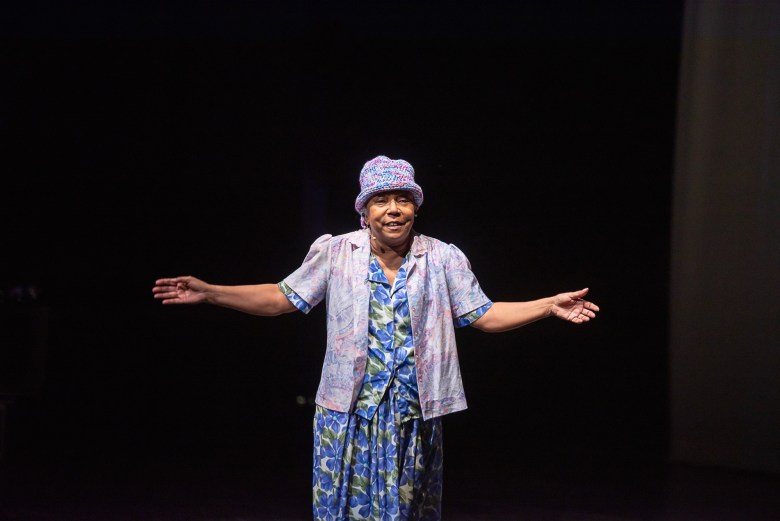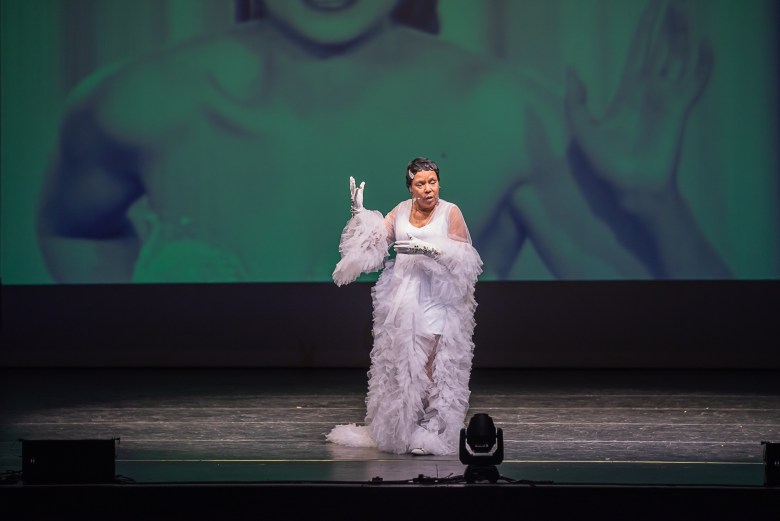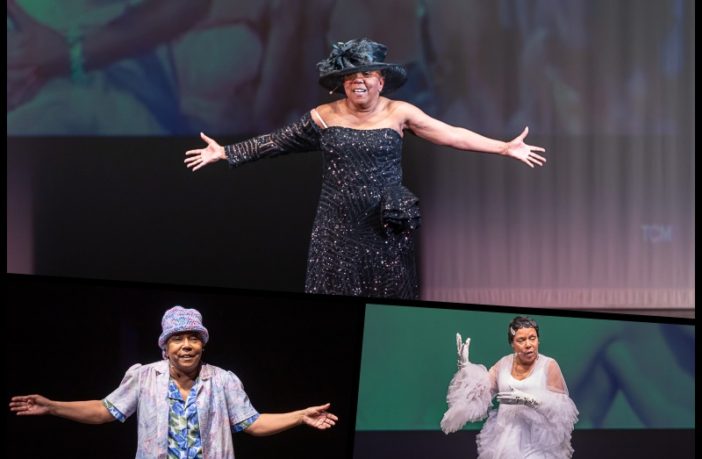By Deborah Bailey,
Contributing Editor
D.C. playwright and director Andy Evans wanted contemporary audiences to get reacquainted with the gifted comedic artistry of D.C. resident and international Black comedian, Jackie Moms Mabley. So he wrote a play about Mabley’s years at the Apollo Theatre in Harlem.
As Evans conceptualized the play about Mabley, who was the first female comedian to perform at the Apollo in 1939, he thought of other Black women who were Mabley’s contemporaries during her 50- plus years in show business. Evans decided to include vignettes of famous Black female singers and dancers who also passed through the Apollo on their way to international fame, with multi-talented Sylvia Traymore Morrison as the sole performer.
“I wrote the play as a tribute to the contribution Black women have made to the performing arts. I wanted to document their struggles, their triumphs, and their magnetism on stage,” said Evans. “I’ve known Sylvia for many years. She has the talent to bring all of this to the stage, to allow the audience to experience these women from many dimensions.”
Morrison is the award winning Black female comedian, actor and singer that also has writing credits to her name. Her resume includes time with Saturday Night Live, one of America’s longest running television shows, where she worked as an associate writer providing a multi-dimensional experience for viewers each week.
Morrison’s comedy has served as opening act for some of the biggest names in entertainment, including Whitney Houston, Gladys Knight, Chaka Khan, the Temptations and Cher. She proclaims to be the first Black comedienne to be billed as an impressionist.
Sylvia Traymore Morrison star of “The Return of Jackie Moms Mabley” portrays Pearl Bailey at the Bowie Center for Performing Arts.
Morrison transformed Evans’ one-woman show on the life of Jackie Moms Mabley into a walk through the lives of famed Black female entertainers of the 20th century, including Ella Fitzgerald, Sarah Vaughn, Billie Holiday, Josephine Baker, Nancy Wilson, Aretha Franklin and Pearl Bailey.
For almost two hours on the Bowie Performing Arts Center Stage Morrison did what she has done her entire career – she gave her all. She sang, danced and provided a real impression of each woman portrayed. The performance transported audience members into the life and times of each woman portrayed.
 Sylvia Traymore Morrison star of “The Return of Jackie Moms Mabley” portrays Moms Mabley at the Bowie Center for Performing Arts.
Sylvia Traymore Morrison star of “The Return of Jackie Moms Mabley” portrays Moms Mabley at the Bowie Center for Performing Arts.
Morrison was humbled by the audience’s reception of her performance, and celebrated the show’s success with friends and family in the reception room after the play’s conclusion. She said the recognition she has received lately has opened a new chapter in her life.
“After 54 years in the business, the world is starting to recognize that I exist,” said Morrison, who has become more popular after a recent guest appearance on entertainer Sherri Shepherd’s show, “Sherri.”
“I guess the world is coming around again,” Morrison said.
The elaborate gowns created to showcase the personal style of the women portrayed in “The Return of Jackie Moms Mabley” were arranged by stylist and fashion show producer Ron Cooke.
 Sylvia Traymore Morrison star of “The Return of Jackie Moms Mabley” portrays Josephine Baker at the Bowie Center for Performing Arts. (Photo courtesy of Eddie Patten)
Sylvia Traymore Morrison star of “The Return of Jackie Moms Mabley” portrays Josephine Baker at the Bowie Center for Performing Arts. (Photo courtesy of Eddie Patten)
Cooke, a native Southeast Washingtonian attended the play and said he has been preparing Morrison for her engagements for years. When he heard Morrison would be the featured actress in “The Return of Moms Mabley,” Cooke got to work.
“It means a lot to work with Sylvia. It was my pleasure to be able to dress her and allow her to exhibit the fashion of Black women in the arts through the 20th century,” Cooke said.
After the Bowie Performing Arts Center, Evans said he will continue to edit and work with the play. He wants to see colleges and universities audiences have an opportunity to learn from the Black women that were portrayed through the play and hopes to connect with many of the area university fine arts programs as well as regional theaters across the mid-Atlantic.



